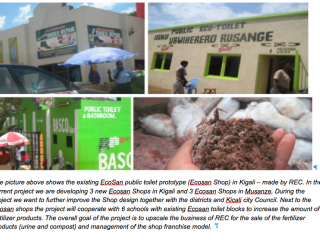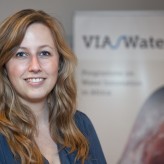Project Results:
About
This project aimed to test a market-led ecological sanitation (ecosan) approach for the reuse of nutrients from human waste as bio-compost in two different urban areas in Rwanda (Kigali and Musanze).
Faecal and urine waste was source-separated and collected by the project from ecosan toilet blocks in local schools and public areas. The project’s ecosan public toilet blocks also had integrated commercial spaces in them for local shopkeepers to rent and use. Faecal waste was subsequently decomposed at different stages at a waste collection facility to produce a nutrient-rich bio-compost to sell to local farming communities. This integrated sanitation approach creates value from waste and has great potential to improve livelihoods and contribute to the circular economy in Rwanda.
Key results
- Construction of toilet blocks with integrated commercial spaces for local shopkeepers in two busy public places in Kigali
- Three schools in Kigali City and three schools in Musanze received refurbished ecosan toilet blocks
- A collection facility established for faecal waste decomposition
- Demonstration events organised for local farmers on the benefits of using bio-compost from ecosan toilets
Challenges/Tips for the future
- Strongly recommended to clearly define the roles and responsibilities of partners at the start of the project
- With circular economy solutions, it is advised to incorporate different methods to increase the quantity and quality of the end-product (bio-compost)
- Negotiating with local government authorities takes time and effort
Potential for growth
The project is currently testing its business model to assess whether it can grow in the future.
Project partners
Rwanda Environmental Care (REC), SaniDev, EFP Ltd., SNV Rwanda
Period
July 2017 – June 2019
Last project updates
Background
The most common type of latrine used in rural Rwanda is the pit latrine. It is perceived widely as a simple solution and one of the most affordable. Nevertheless concerns are being raised about the limitations of this technology in relation to poor conditions of emptying, handling and disposal when filled, difficulties related to the user interface such as unpleasant smell and flies as well as the risk of ground and surface water pollution in particular geological contexts. Rwanda is an agricultural country whose population has outgrown its arable land. Insufficient fertilizer is also an issue for intensive agriculture and sustained food security. For that reason Ecological sanitation (EcoSan) is seen in Rwanda as an option to responds to improve hygiene and sanitation and the need for biological fertilizer. EcoSan is based on three principles: preventing pollution rather than attempting to control it after we pollute; sanitizing the urine and the faeces; and using the safe products for agricultural production. The 2010 Rwandan Water and Sanitation Sector Policy (Watsan Policy) further recognizes EcoSan as an option that should be promoted across the country. While it is seen as a viable solution conceptually, the operationalization so far has produced mixed results. Furthermore the lack of information about the success/constraints of promoting ecological sanitation behind a lifespan-bound project is a concern. From January 2014 till December 2015, SNV Rwanda has implemented a pilot project funded by the Dutch government, on ecological sanitation in Burera and Nyabihu districts. The project objective was to contribute to sustainable rural sanitation through ecological sanitation demonstration model and use of the dry toilet by-products in agriculture. The project targeted 4 sectors in 2 volcanic region districts – 2000 families in 10 communities - 3600 students in 20 Schools. The Stockholm Environment Institute (SEI) that is known worldwide for their expertise in ecological sanitation assisted SNV in this project. SEI supported SNV in the innovations of the EcoSan design and analysing the data of the Baseline survey and Barrier Analysis to introduce the EcoSan concept in the selected rural districts Burera and Nyabihu. After a year of implementation the project achieved the following results: • More than 400 households within the 4 sectors supporting EcoSan technology; • Support of the Burera district, offering construction materials for 40 households; • 10 Schools started to fertilize their gardens with urine collected through EcoSan latrines; • Three cooperatives have improved capacities to collect and market urine from dry toilets for use in farming; • About 70,000 people reached with messages on Ecosan and Hygiene • District sanitation stakeholders‟ forum was organized for local authorities to further support ecological sanitation. The SNV pilot project showed EcoSan appears to be a suitable sanitation solution for Rwanda but the knowledge gap around the concept, principle and implementation of dry toilet technology is still an issue at local level. The outcomes of the SNV pilot shows the current EcoSan technology should be technically upgraded in order to develop a sustainable business for the urban context: (the handling of compost is not efficient enough, the steps to enter the toilets are too high, the toilet should be designed in a way it is more socially accepted, „design as a normal toilet at low cost‟). There is certainly a market for the fertilizers produced, as the SNV project showed that the use of urine as fertilizer are key drivers for scale-up of dry toilets, due to high cost of chemical fertilizer and a lack of bio fertilizers in the region. To assure this business boosting awareness is needed on the benefits of EcoSan for health and agricultural production. This project proposal will try to address above goals. While focusing on the urban context with public toilets and schools of Musanze and Kigali this project increases the awareness of people about EcoSan toilet technology, improving health standards and boosting agricultural production.
Project Plan
The following outputs and activities are planned during the 18 months project period: Output 1 Developing EcoSan public toilet services network 1.1 Development of the concept (prototype toilet and design shop) 1.2 Development of franchisee model including shop design 1.3 Development of criteria and selection procedure for franchisees 1.4 Recruitment and training of staff for franchisee network management and maintenance 1.5 Recruitment of franchisees 1.6 Acquisition of land plots 1.7 Construction of 6 toilet blocks 1.8 Training of franchisees Output 2 Introduction of EcoSan toilets at schools 2.1 Definition of cooperation modality with schools 2.2 Selection of schools and signing cooperation agreements 2.3 Adjustments of toilet blocks 2.4 Training of school staff 2.5 Training of students 2.6 National worshop/learning event(first) Output 3 Production, promotion and sales of bio fertiliser 3.1 Fertilizers production /Toilet in use 3.2 Design and construction of 2 demo sites 3.3 Recruitment of staff for demo sites 3.4 Training of staff 3.5 Fertilizers chemical and microbial test(labo) 3.6 Demonstration events for farmers 3.7 Development and production manual of bio -fertilizers for key crops 3.8. National workshop
Target group
There are four groups of beneficiaries of this project, as listed below: ➢ Users of public toilets. With the daily use of 60 people per toilet / urinal unit, 18 shops will have over 1.051.200 annual visits ➢ Children and teachers at 6 schools. On average a school will have about 320 children who will benefit from new separated girls’ and boys’ toilets, total about 2400 children. ➢ Farmers. An estimated 195 tons of NPK (and 698 tons of urea) will be sold to farmer cooperatives, with 8 tons NPK / hectare and 1 hectare / farmer, this means which is sufficient for 24 farmers ➢ Franchisees. It is expected that a franchisee will earn between RWF 600.000 (50.000 * 12 months) from operating shop, 18 franchisees will be recruited during the project.
Sustainability
The goal of this project is to reach a sustainable business for REC, using the fertilzer products of 6 public toilet blocks and 6 schooltoilet blocks. To reach a sustainable business it is very important that the Ecosan product amount stays sufficient in future. It is therefor very important to come to an agreed innovative shop design and arrangement on plot selection together with the local aotorities. In that way we can assure the long existance of the Ecosan shops. Furthermore the maintenance of Ecosan toilets at the 6 schools could be guaranteed by improved Ecosan system knowledge and awareness by school staff and students. Furthermore during the projectperiod we should use all lessons learned to come to efficient logistics of transport and packaging of the products.
Overview of Goals
The project goal is upscale the business of bio fertilizer out of ecological (dry) sanitation EcoSan in Rwanda. The production of EcoSan products (compost and urea) will be increased by the building of EcoSan public toilets and school toilet blocks in Musanze and Kigali.
Results and indicators
- Introduction of Ecosan toilet at School
- Learning and sharing events(National workshop(first) ( target )
- In order to share what we have learnt during project implementation, a workshop will be organised where challenges and success are presented to share experiences/way forward with other actors in sanitation and hygiene a well as agriculture sectors.
- contracts signed between schools and SNV ( target )
- SNV will sign a cooperation agreements with schools stipulating the way for refurbishment of existing ecosan toilets as well as refreshment training in with school students,teachers and parents committee on the benefit of ecosan toilet use for hygiene and sanitation as well as agricultural purpose.
- Ecosan public toilet service network developed
- Six ecosan public toilets in Kigali and Musanze are built ( target )
- 6 blocks of public toilets (of 8 toilets and 3 shops each) are built in Kigali and Musanze towns. 18 Franchisees shops are built and operated by franchisee people under supervision of SANI Ltd and EFP Ltd
- 6 contracts for plot are signed ( target )
- Six contract for land plots should be signed between EFP Ltd ,SANI Ltd and local authority/private land owner.
- recruitment and training of franchisees ( target )
- Production,promotion and sales
- Two demo-sites are designed and built ( target )
- Two demonstration sites will be built for collection and processing fertilizer from public toilets.Here will be also demo site for trials where crops will be grown and comparing the results of ecosan fertilizers vs chemical fertilizers.



